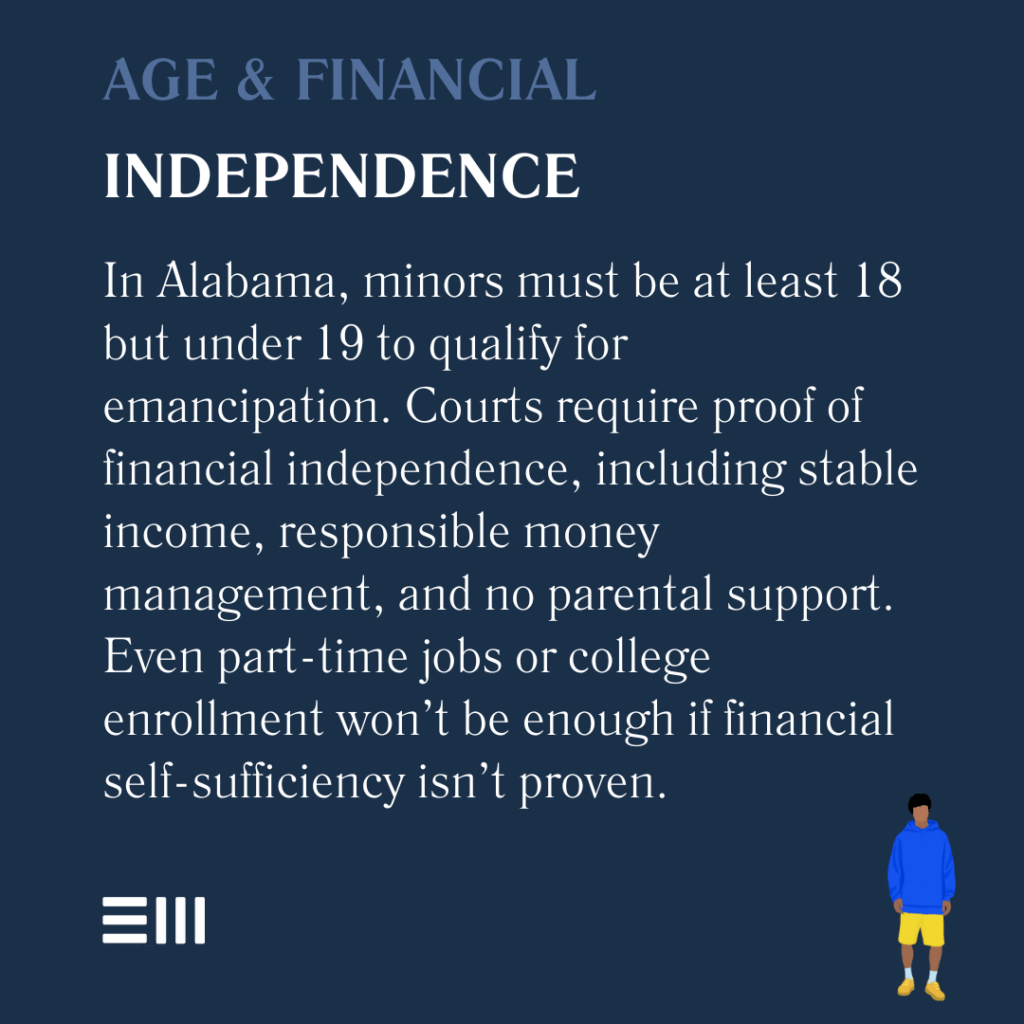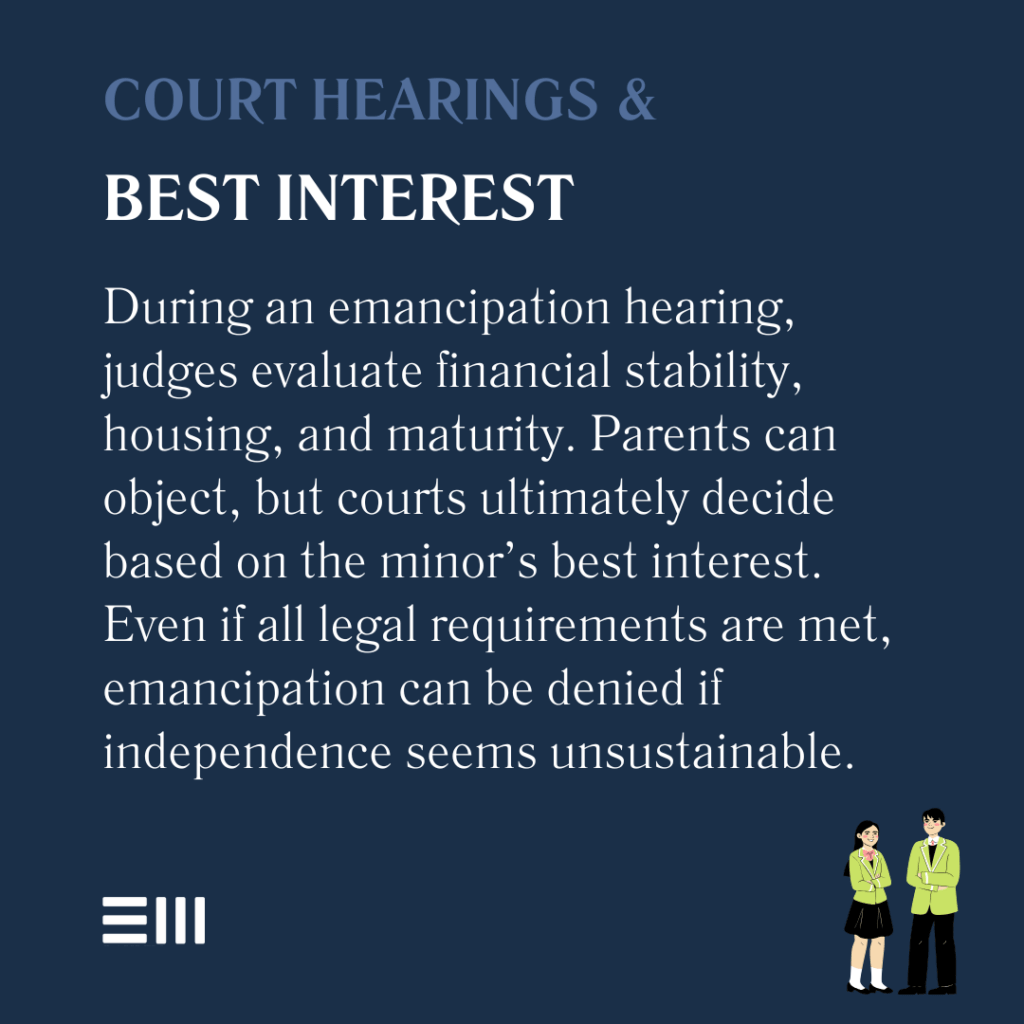
At 17, Denina Anderson moved out of her mother’s home to live with her boyfriend against both parents’ wishes. She enrolled in community college, worked part-time, and purchased a car.
Despite these adult actions, the Alabama Court of Civil Appeals ruled she wasn’t emancipated, and her father still owed child support.
Every year, hundreds of Alabama teenagers like Denina seek independence before turning 19, only to discover Alabama’s emancipation laws contain unexpected hurdles and precise requirements that few understand.
Emancipation offers minors legal freedom from parental control, but Alabama’s qualification standards remain some of the nation’s most stringent and least understood.
The path between childhood dependence and adult independence has specific landmarks you must navigate successfully.
Age Requirements for Emancipation in Alabama
Alabama law establishes precise age parameters for minors seeking emancipation, creating a unique window of opportunity. Unlike many states where emancipation might be available to minors as young as 16, Alabama Code Section 26-13-1 specifically requires petitioners to be at least 18 years old before filing for emancipation.
This creates a narrow one-year window for seeking emancipation in Alabama, as the state’s age of majority is 19.
The legislature designed this requirement to ensure that only minors approaching adulthood could petition for emancipation, reflecting Alabama’s traditional approach to family structure and parental authority.
This age restriction means high school students cannot typically qualify unless they’ve already turned 18 before graduation.
The Alabama Supreme Court has consistently upheld this age requirement, rejecting attempts to expand emancipation to younger minors. Judges throughout Alabama’s judicial circuits have no discretion to waive this statutory age minimum regardless of a minor’s maturity or circumstances.

Financial Independence Requirements
Courts in Alabama demand substantial proof of financial self-sufficiency before granting emancipation. The qualification standards reflect the reality that emancipation transfers full financial responsibility to the minor, ending any parental support obligations.
To qualify financially for emancipation, a minor must demonstrate:
- Stable employment with income sufficient to cover all living expenses;
- Proper management of personal finances, including checking/savings accounts;
- Ability to pay for housing, food, transportation, and healthcare;
- History of financial responsibility and independence from parental support; and
- Realistic budget showing sustainable self-sufficiency.
The Anderson v. Loper case established that merely having a part-time job while relying on parental support doesn’t satisfy this requirement.
The Court of Civil Appeals specifically noted that Denina Anderson’s part-time job and college enrollment didn’t demonstrate sufficient financial independence to warrant emancipation.
Alabama courts examine both current financial status and future sustainability when evaluating emancipation petitions.
Even temporarily adequate finances won’t satisfy the court if the arrangement appears unsustainable long-term. The financial independence test represents the most common reason Alabama courts deny emancipation petitions.
Living Arrangement Requirements
Independent living arrangements constitute a fundamental requirement for emancipation qualification in Alabama. The courts specifically evaluate housing stability, safety, and separation from parental control when considering emancipation petitions.
Qualifying living arrangements typically include:
- Independent apartment or housing with a lease in the minor’s name;
- College dormitory or student housing (with year-round arrangements);
- Shared housing where the minor contributes financially;
- Military housing for minors enlisted in the armed services; and
- Separate living space within extended family property (under specific conditions).
The Anderson case emphasized that merely moving from a parent’s home doesn’t satisfy this requirement. The court noted that Denina’s arrangement living with her boyfriend and his family didn’t constitute a truly independent living situation that would support emancipation.
Alabama courts carefully distinguish between minors who have established genuinely independent living situations and those who have simply relocated to another dependent arrangement.
Housing arrangements must demonstrate both physical and financial independence from parents to satisfy this qualification.
Maturity and Best Interest Standards
Beyond age, financial, and housing requirements, Alabama courts apply a subjective “best interest” standard to emancipation petitions. This evaluation focuses on the minor’s demonstrated maturity and whether emancipation genuinely serves their welfare.
Factors courts consider in this assessment include:
- Academic performance and educational commitments;
- Career goals and preparation;
- Personal responsibility and decision-making history;
- Mental and emotional stability;
- Ability to navigate adult responsibilities independently;
- Support systems beyond parents; and
- Specific benefits emancipation would provide.
The Anderson court highlighted that emancipation must serve the minor’s best interests, not merely reflect their desire for independence. Judge Monroe’s special concurrence noted that courts must balance respect for a minor’s independence with concern for their welfare.
This subjective standard gives Alabama judges significant discretion in granting or denying emancipation. Even when meeting all technical qualifications, petitioners must convince the court that emancipation represents a positive step in their development rather than a premature assumption of adult responsibilities.
Legal Process: Filing Your Petition
The emancipation process begins with properly filing a petition in the appropriate Alabama court. This formal request initiates legal proceedings and must satisfy specific requirements to be considered valid.
The petition filing process involves:
- Selecting the proper court (typically Family Court or Juvenile Court in your county);
- Completing the emancipation petition form with all required information;
- Gathering supporting documentation of qualifications;
- Paying filing fees (typically $200-300, though fee waivers may be available);
- Serving notice to parents or legal guardians; and
- Scheduling an initial hearing date.
Alabama doesn’t provide standardized emancipation petition forms, requiring petitioners to draft custom documents appropriate to their circumstances. The petition must specifically address each qualification requirement with supporting evidence and clearly state why emancipation serves the minor’s best interest.
Filing an incomplete or improperly formatted petition represents one of the most common reasons for unnecessary delays or denials. The appropriate court for filing varies by county, with some jurisdictions handling emancipation through family court and others through juvenile court divisions.
The Court Hearing and Decision Process
The emancipation hearing represents the culmination of the qualification and petition process, where the court makes its final determination based on evidence and testimony presented.
During the typical emancipation hearing:
- The judge reviews the petition and supporting documentation;
- The petitioner presents evidence of their qualifications;
- Parents or guardians may present opposing arguments;
- The judge may question the petitioner directly about their circumstances;
- Character witnesses may testify about the petitioner’s maturity;
- The judge evaluates whether emancipation serves the minor’s best interest; and
- A formal ruling is issued either granting or denying emancipation.
The Anderson case illustrates how thoroughly Alabama courts examine qualification evidence. The appellate court upheld the trial court’s detailed factual findings regarding Denina’s living situation, financial dependence, and continued parental influence.
Hearings typically last 30-60 minutes but may extend longer in contested cases. Some straightforward petitions receive approval immediately, while others result in continued hearings pending additional evidence.
Judges may also issue conditional approvals requiring follow-up verification of continued qualification.

Special Circumstances That May Affect Qualification
While Alabama law establishes general qualification requirements, certain special circumstances can influence emancipation eligibility and process. These situations may strengthen or complicate a minor’s petition.
Special circumstances that affect qualification include:
- Military enlistment (which may support emancipation);
- Marriage (which automatically emancipates for some purposes);
- Parenthood (which may demonstrate maturity but doesn’t automatically qualify);
- College enrollment (considered positively but insufficient alone);
- Previous court involvement (juvenile cases may complicate petitions);
- Disability status (requiring additional evidence of independence); and
- International/immigration status (creating jurisdictional questions).
The Anderson case specifically noted that Denina’s college enrollment represented a positive factor but didn’t automatically qualify her for emancipation while she remained financially dependent on parental support.
Similarly, her independent housing choice wasn’t sufficient without corresponding financial independence.
Courts evaluate these special circumstances within the overall context of the statutory requirements and best interest standard. No single factor guarantees qualification, but certain circumstances may strengthen an otherwise marginal petition or overcome specific qualification concerns.
Frequently Asked Questions About Emancipation Qualification in Alabama
Many potential petitioners have questions about Alabama’s emancipation qualification standards and process.
These frequently asked questions address the most common concerns about who qualifies and what steps to take.
Does Getting Married Automatically Emancipate a Minor in Alabama?
Marriage creates a limited form of emancipation in Alabama. A married minor can make certain independent decisions, including medical choices and contractual agreements related to necessities.
However, marriage doesn’t confer complete emancipation for all purposes, particularly regarding education requirements and certain consent issues.
Can Parents Object to an Emancipation Petition?
Yes, parents or legal guardians have the right to object to emancipation petitions. The court will consider their objections during the hearing process.
However, parental opposition doesn’t automatically disqualify a petition if the minor meets all other requirements and can demonstrate emancipation serves their best interest.
Does Working Full-Time Qualify a Minor for Emancipation?
Employment alone doesn’t qualify a minor for emancipation. While full-time employment demonstrates financial capability, the petitioner must still meet the age requirement (18+) and prove complete independence from parental support.
The Anderson case specifically established that part-time employment while receiving parental support doesn’t satisfy emancipation requirements.
Securing Your Independence: Next Steps with Expert Guidance
Navigating Alabama’s emancipation qualification requirements demands precision, preparation, and understanding of complex legal standards. Our team of experienced family law attorneys has successfully guided minors through this challenging process for over 20 years.
Don’t risk denial due to preventable errors or incomplete documentation. Our attorneys understand the specific qualification evidence Alabama courts require and how to present your case effectively.
We’ve helped hundreds of qualified minors achieve legal independence through properly structured emancipation petitions.
Contact Baxley Maniscalco today for a confidential consultation about your emancipation case. Our compassionate approach and legal expertise will help you determine whether you qualify and guide you through each step of the emancipation process with confidence.
Can't find what you're looking for? Search our site below.










